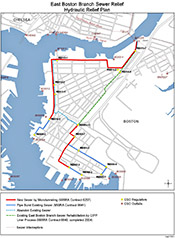FOR IMMEDIATE RELEASE
Ria Convery, Communications Director
(617) 788-1105, <ria.convery@mwra.state.ma.us>
Jeffrey McLaughlin, Community Relations Manager
(617) 660-7976 <jeffrey.mclaughlin@mwra.state.ma.us>
CONSTRUCTION SET TO BEGIN ON EAST BOSTON SEWER LINE
Will minimize overflows to Chelsea Creek and Boston Harbor
|
The Massachusetts Water Resources Authority recently awarded a $59.9 million contract for the construction of 2.5 miles of new sewer lines along Chelsea, East Eagle, Condor, Border, Marginal, Orleans, Gove, Bremen and Porter Streets.
The contract was awarded to Barletta Heavy Division of Canton in July and work is set to begin this Fall. The primary construction method will be micro-tunneling, which was chosen to reduce the amount of open trench excavation along the East Boston streets.
MWRA has been invited to provide an overview of the project to the East Boston Eagle Hill Civic Association at its meeting on Wednesday, August 27, 2008 at 7:00 p.m., and the Friends of the East Boston Greenway at its meeting on Thursday, September 25, 2008 at 6:30 p.m.
This is the second of three MWRA construction contracts aimed at increasing the capacity of the 113-year-old East Boston Branch Sewer that currently carries combined sewer flows – a mix of sanitary sewage and stormwater to the East Boston Caruso Pump Station, located at the Chelsea St Bridge, and then to Deer Island for treatment. The first contract involved rehabilitation of 6,000 feet of the existing East Boston Branch Sewer, mostly along Chelsea Street, and was completed in 2004. The third and final contract is scheduled to begin in early 2009 and will replace approximately 5,000 feet of the existing East Boston Branch Sewer. (See map.)
This project is required by the federal court as part of the Boston Harbor Clean-up case. There are ten active combined sewer overflow (CSO) outfalls along the East Boston shoreline that discharge to Chelsea Creek and Boston Harbor. When the entire project is completed by Summer 2010, it will reduce CSO discharges at these outfalls from 31 to 6 times a year on average and reduce average annual discharge volume by nearly 80%. Ongoing work by the Boston Water and Sewer Commission to separate sewers in East Boston, such as the Border and Condor Streets Project, are expected to reduce CSO discharges even further.
The East Boston project is one of 35 projects in MWRA’s long-term CSO control plan to bring CSO discharges in metropolitan Boston into compliance with the federal Clean Water Act and state water quality standards.
###
Updated April 7, 2011
